Opioid Dependency Affects Perception Of Babies’ Cuteness, Research Suggests

People’s perception about babies’ cuteness changes when they are high on opioids, a small study presented Monday at the European College of Neuropsychopharmacology Congress in Vienna, Austria, suggested. Researchers said finding babies cute is likely to encourage people to care for others and lack of this emotion limits a person’s caretaking abilities.
In a bid to find out how opioid dependency affects perception of babies’ cuteness, the researchers assessed brain responses of 47 people on opioids using a series of facial characteristics called baby schema. These features included large eyes, big foreheads and small chins. The traits were identified in a 2009 study that showed that looking at images of babies with these features was associated with an increase in activity in the part of the brain linked to rewards.
For the latest study, respondents were scheduled to undergo treatment with naltrexone, an opioid blocker. They saw the photos of cute babies 10 days before starting treatment and 10 days after onset of the treatment. Researchers scanned the brains of the participants when they viewed images of cute babies.
“We found that the brains of people with opioid dependence didn’t respond to the baby schema. When they were given a drug that blocked the effects of opioids, the response became more similar to the healthy people. This may indicate the mechanism underlying problems with social cognition deficits in people who abuse opioids,” Professor Daniel Langleben, professor of psychiatry at the University of Pennsylvania and the senior author of the study, said in a statement.
The study has not been published in a peer-reviewed journal.
Published by Medicaldaily.com



























